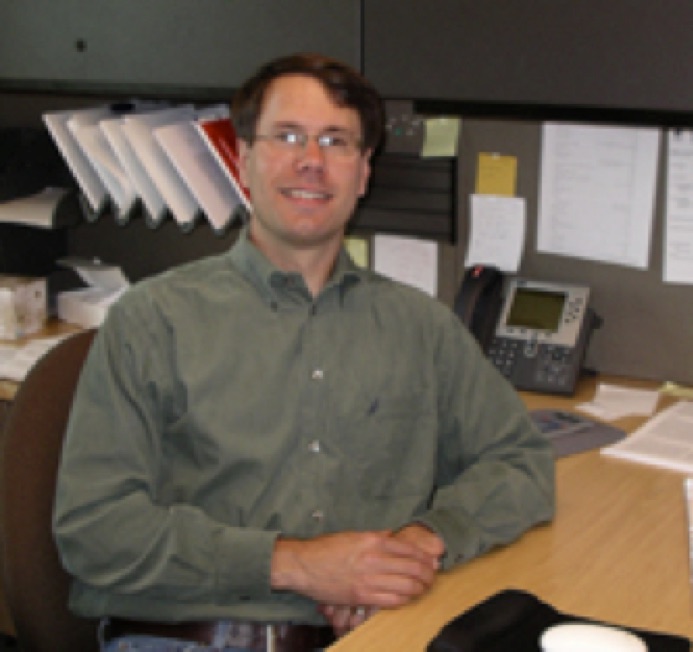Bryan Welm
Adjunct Associate Professor of Oncological Sciences and Associate Professor of Surgery
Breast Cancer/ Stem Cells

Molecular Biology Program
Biological Chemistry Program
Education
B.A. University of California, Santa Cruz
Ph.D. Baylor College of Medicine
Research
Breast cancer is not a single disease, but is comprised of distinct molecular subtypes that lead to different clinical outcomes. Over the past 30 years, treatments for breast cancer have evolved with the development of biologics and tailored chemotherapies; however, the majority of breast cancer patients are still vastly over-treated or ineffectively treated. In 2009, there were more than 175,000 new cases and 40,000 deaths from breast cancer in the US, making it the second leading cause of cancer related death in women (American Cancer Society). It has been proposed that modest progress in breast cancer treatment and survival rates may be due to the fact that the disease is very diverse, resulting in inconsistent clinical responses to standard therapies. The development of subtype-specific cancer therapeutics will be critical to overcome this problem.
The presence of specific breast cancer subtypes raises questions about the cellular origin of cancer. Does breast cancer initiate from transformation of stem or progenitor cells that give rise to different tumor subtypes? Or, does the lineage/differentiation capacity of the transformed cell dictate the tumor's subsequent cancer subtype? The relationship between cellular differentiation and transformation has not been thoroughly explored, and it is not known whether specific oncogenic pathways cooperate with intrinsic differentiation programs to establish cancer subtypes.
In order to investigate the molecular processes controlling cancer subtype determination, and facilitate the development of subtype-specific therapeutics, my laboratory is developing new model systems that more appropriately mimic the cellular heterogeneity observed in breast cancer. The main projects in my laboratory are:
Determination of the Cellular Origins of Breast Cancer
We are performing experiments to determine whether specific oncogenic pathways targeted to different mammary epithelial cell populations can affect the cellular composition and pathology of tumors.
Chemical Library Screen to Identify Cancer-Subtype-Specific Therapeutics
The molecular and cellular complexity of breast cancer is not appropriately reproduced with established cell lines. Therefore, we developed a chemical library screen using primary tumor organoids derived from different cancer subtypes. The tumor organoids representing specific subtypes are grown as 3D structures within a laminin-rich extracellular matrix and screened using chemical libraries in order to identify subtype-specific anti-cancer compounds.
References
- Smith BA, Shelton DN, Kieffer C, Milash B, Usary J, Perou CM, Bernard PS, Welm BE (2012) Targeting the PyMT Oncogene to Diverse Mammary Cell Populations Enhances Tumor Heterogeneity and Generates Rare Breast Cancer Subtypes. Genes Cancer3(9-10):550-63
- Basham KJ, Kieffer C, Shelton DN, Leonard CJ, Bhonde VR, Vankayalapati H, Milash B, Bearss DJ, Looper RE, Welm BE (2013) Chemical genetic screen reveals a role for desmosomal adhesion in mammary branching morphogenesis. J Biol Chem 288(4):2261-70
- DeRose YS, Wang G, Lin YC, Bernard PS, Buys SS, Ebbert MT, Factor R, Matsen C, Milash BA, Nelson E, Neumayer L, Randall RL, Stijleman IJ, Welm BE, Welm AL (2011) Tumor grafts derived from women with breast cancer authentically reflect tumor pathology, growth, metastasis and disease outcomes. Nat Med, 17(11):1514-20
- Pathak TP, Gligorich KM, Welm BE, Sigman MS (2010) Synthesis and preliminary biological studies of 3-substituted indoles accessed by a palladium-catalyzed enantioselective alkene difunctionalization reaction. J Am Chem Soc, 132(23):7870-1
- Shelton DN, Fernandez-Gonzalez R, Illa-Bochaca I, Ortiz-de-Solorzano C, Barcellos-Hoff MH, Welm BE (2010) Use of stem cell markers in dissociated mammary populations. Methods Mol Biol, 621:49-55
- Welm BE, Dijkgraaf GJ, Bledau AS, Welm AL, Werb Z (2008) Lentiviral transduction of mammary stem cells for analysis of gene function during development and cancer. Cell Stem Cell, 2(1):90-102
- Welm B, Behbod F, Goodell MA, Rosen JM (2003) Isolation and characterization of functional mammary gland stem cells. Cell Prolif. Oct;36 Suppl 1:17-32
- Li Y, Welm B, Podsypanina K, Huang S, Chamorro M, Zhang X, Rowlands T, Egeblad M, Cowin P, Werb Z, Tan LK, Rosen JM, Varmus HE (2003) Evidence that transgenes encoding components of the Wnt signaling pathway preferentially induce mammary cancers from progenitor cells. Proc Natl Acad Sci USA Dec 23;100(26):15853-8
- Welm BE, Tepera SB, Venezia T, Graubert TA, Rosen JM, Goodell MA (2002) Sca-1(pos) cells in the mouse mammary gland represent an enriched progenitor cell population. Dev Biol. 245:42-56
